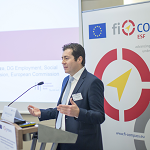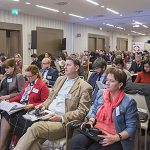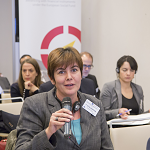ESF financial instruments supporting employment, entrepreneurship and social inclusion in the 2014-2020 programming period
Overview

Picture: Mr Andrea Da Pozzo, DG Employment, Social Affairs and Inclusion, European Commission
Financial instruments can be co-funded by the European Social Fund (ESF) to promote sustainable and quality employment and to support labour mobility (Thematic Objective 8 – TO8) and to promote social inclusion, combat poverty and any discrimination (Thematic Objective 9 – TO9). The fi-compass thematic workshop on 31 January 2018 in Rome welcomed a high number of participants from ESF managing authorities, financial intermediaries and other stakeholders from different Member States, interested in exploring the opportunities that ESF financial instruments offer under TO8 and TO9.
In his welcome speech, Andrea Da Pozzo, Directorate General for Employment Social Affairs & Inclusion (DG EMPL), European Commission, highlighted the opportunity for ESF managing authorities and other stakeholders participating in the workshop to take an active role in practical discussions and share their experience.
Experiences from the Sicilian Region in Italy in implementing of the JEREMIE Initiative under the ESF were shared at the start of the workshop by Gianluca Palermo, European Investment Fund (EIF). Within the ESF Regional OP 2007-2013, the managing authority in Sicily committed EUR 15 million to the implementation of the financial instrument, managed by the EIF acting through the JEREMIE Holding Fund. The initiative engaged financial intermediaries providing support to Sicilian micro-enterprises, with a particular emphasis on social inclusion, social entrepreneurship and the inclusion of disadvantaged groups in the labour market.

Picture: Event overview
Following this, the first Hungarian ESF financial instrument under the Human Resources Development Operational Programme (HRDOP) in the 2014-2020 programming period was presented in detail by Szabó János Zoltán, Ministry of Human Resources, Hungary, and Györgyi Nyikos, EU Competence Centre Directorate, Hungarian Development Bank. The loan programme is co-financed by the ESF under the HRDOP and was launched by Hungarian authorities in November 2017. The two speakers directly involved in this financial instrument described the implementation of the loan programme, analysed the practical aspects and discussed with participants their lessons learnt.
Lilia Stoyanovich, Ministry of Labour and Social Policy, Bulgaria (managing authority) and Dimitar Cherkezov, EU Operational Programmes, Fund Manager of Financial Instruments in Bulgaria – FMFIB, spoke about the Human Resources Development Operational Programme (OP HRD) Risk-sharing Micro-Finance facility in Bulgaria in the 2014-2020 programming period. Also, in this case, it is the first ESF financial instrument implemented in Bulgaria. The speakers described the process of implementation so far, emphasising practical aspects and key challenges.
The afternoon focused on innovative instruments promoting employability. Luca Galassi and Gabriele Pazzola from the managing authority of the ESF Regional OP in Sardinia (Italy) described to participants the state of play and experiences with different types of innovative instruments with ESF that the region has implemented in the 2014-2020 programming period.

Picture: Q&A discussion
Furthermore, the possibility of an ESF contribution to the EaSI financial instrument under Article 38.1(a) CPR was explained to participants by Guadelupe de la Mata, EIF. She shared insights into the collaboration with Comunidad de Madrid, Spain (managing authority) on this pilot and highlighted ten useful lessons learned concerning the design of such a financial instrument.
The last session of the Rome workshop addressed the topic of reporting of ESF financial instruments in the 2014-2020 programming period. Roberto Palloni, a fi-compass expert, presented a summary of data on the progress of implementation of ESF financial instruments under 2014-2020 programming period. Rosanna Romano and Salvatore Vescina of the Agency for Territorial Cohesion in Italy complemented this session with insights into the Italian experience in ESF financial instruments reporting.
Jader Canè, DG EMPL, European Commission, highlighted in his final remarks the opportunity to take advantage of the fi-compass Capacity Building Services (CBS), which can provide specific advice to ESF managing authorities about financial instruments.
The high interest in this workshop as well as the many discussions and peer-to-peer exchanges on the subject matter that took place during the event, underline the importance of experience sharing on TO8 and TO9 financial instruments between ESF managing authorities, financial intermediaries and all other directly involved stakeholders which fi-compass will support also in the future.
| Title | Speakers | ||
|---|---|---|---|
| |
JEREMIE under the ESF – Experiences of the Sicilian region |
Mr Gianluca Palermo, European Investment Fund |
|
| |
HRDOP Loan programme in Hungary in the 2014-2020 programming period |
Dr Szabó János Zoltán, Ministry of Human Resources, Hungary |
|
| |
HRDOP Loan programme in Hungary in the 2014-2020 programming period |
Dr Györgyi Nyikos, Director of EU Competence Center Directorate, Hungarian Development Bank |
|
| |
OP HRD Risk-sharing Micro-Finance facility in Bulgaria in the 2014-2020 programming period |
Ms Lilia Stoyanovich, Managing authority, Ministry of Labour and Social Policy, Bulgaria |
|
| |
OP HRD Risk-sharing Micro-Finance facility in Bulgaria in the 2014-2020 programming period |
Mr Dimitar Cherkezov, Fund Manager of Financial Instruments in Bulgaria (FMFIB) |
|
| |
Innovative ESF financial instruments in the Sardinia region |
Mr Luca Galassi, Managing authority of the ESF Regional OP, Sardinia, Italy |
|
| |
Innovative ESF financial instruments in the Sardinia region |
Mr Gabriele Pazzola, Managing authority of the ESF Regional OP, Sardinia, Italy |
|
| |
ESF contribution to the EaSI financial instrument under Art. 38.1(a) CPR |
Ms Guadalupe de la Mata, European Investment Fund |
|
| |
Summary of data on the progress of implementation of ESF financial instruments under 2014-2020 programming period |
Mr Roberto Palloni, fi-compass expert |
|
| |
ESF financial instruments reporting - the Italian experience |
Mr Salvatore Vescina, Agency for Territorial Cohesion, Italy |

